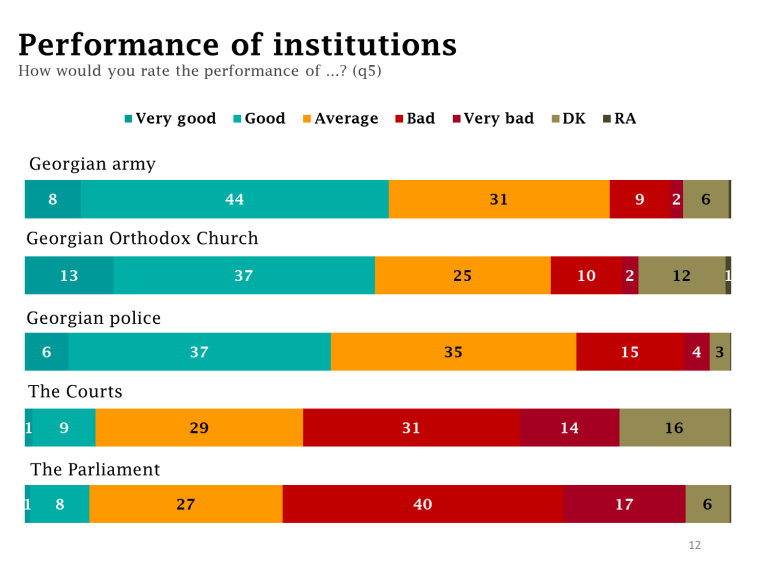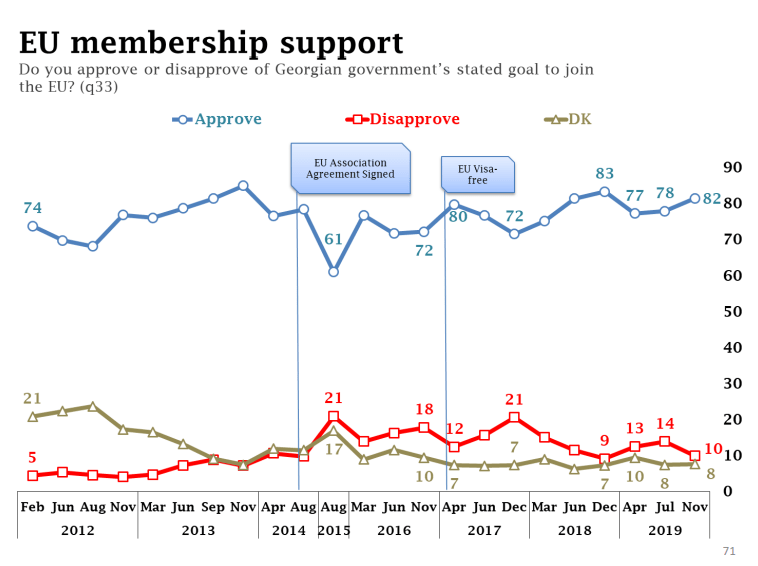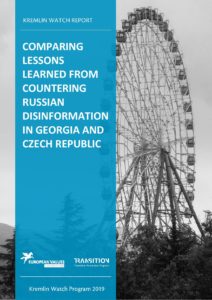Georgians’ trust in the country’s democratic institutions have been shaken by recent events, according to the results of a public opinion survey conducted by the National Democratic Institute (NDI), in partnership with the Caucasus Research Resource Center (CRRC-Georgia).
The current political situation reflects the continuation of a downward trend that started in early 2018, NDI observes, noting that 53% number of respondents believe the country is going in the “wrong direction”, compared to 49% in July 2019.
 The poll reveals that 59% say that Georgia is not a democracy, the lowest rating since 2010, although 33% of respondents insist that the state is democratic. Some 64% of respondents rate government performance as “bad,” a 15% increase compared to March 2018. Only 30% of respondents rate government performance as “good”, a 15% decline on the March 2018 figure.
The poll reveals that 59% say that Georgia is not a democracy, the lowest rating since 2010, although 33% of respondents insist that the state is democratic. Some 64% of respondents rate government performance as “bad,” a 15% increase compared to March 2018. Only 30% of respondents rate government performance as “good”, a 15% decline on the March 2018 figure.
Respondents gave the highest performance ranking to the Georgian army – 52% (53% in July 2019) and Georgian Orthodox Church – 50% (64% in July 2019). The police ranked 43%, with 35% deeming it average and 19% as “bad.” The Courts (45%) and the Parliament (57%) – an all-time low – are considered the lowest performing national institutions.
 With less that a year left until the 2020 parliamentary elections, a majority of Georgians remain undecided (56 percent) for whom they would vote, adds NDI, a core institute of the National Endowment for Democracy:
With less that a year left until the 2020 parliamentary elections, a majority of Georgians remain undecided (56 percent) for whom they would vote, adds NDI, a core institute of the National Endowment for Democracy:
 As elections draw nearer, political parties will need to present forward looking visions and concrete ideas that address citizen priorities to earn voter support. An anticipated three percent threshold presents a unique opportunity for smaller parties and new entrants to enter parliament, resulting in a more diverse convocation. NDI’s current poll bears this out as seven political parties register the requisite three percent level of public support.
As elections draw nearer, political parties will need to present forward looking visions and concrete ideas that address citizen priorities to earn voter support. An anticipated three percent threshold presents a unique opportunity for smaller parties and new entrants to enter parliament, resulting in a more diverse convocation. NDI’s current poll bears this out as seven political parties register the requisite three percent level of public support.
“It is alarming to see such low public approval of democratic institutions, and it does not bode well for the country’s future growth and stability,” said NDI senior director Laura Thornton. “It is incumbent upon all political leaders, but particularly those in power, to rebuild the public’s trust in the country’s governance and ensure the legitimacy of the upcoming election process,” she added.
 The U.S. recently called on Georgia to reinforce its commitment to democracy and ensure its judicial system is free of political bias, after weeks of demonstrations in the ex-Soviet state demanding changes to the electoral system, Reuters reports.
The U.S. recently called on Georgia to reinforce its commitment to democracy and ensure its judicial system is free of political bias, after weeks of demonstrations in the ex-Soviet state demanding changes to the electoral system, Reuters reports.
Despite exposure to Russian disinformation for decades, Georgia’s state policy against the threat still lags behind, according to a new report.
“Comparing lessons learned from countering Russian disinformation in Georgia and the Czech Republic” analyzes the state of play of Russia’s malign narratives, “agents of influence”, tactics and tools that the Kremlin employs for exploiting vulnerabilities in Georgia and the Czech Republic, the European Values Center for Security Policy reports.
Mariam Tsitsikashvili, a Non-resident Fellow at the Kremlin Watch Program and Research Fellow at Georgia’s Reforms Associates (GRASS), examines the footprint of Russia’s malign influence in 3 dimensions: political, media, and societal. The report provides recommendations for the Georgian government and the civil society based on lessons learned from the Czech counter-disinformation measures at governmental and non-governmental levels.
While Armenia and Georgia are relative democratic bright spots in the region, Azerbaijan is not, Karena Avedissian writes for the EVN Report (above):
Over the last decade in particular, Azerbaijan’s civil society has been decimated by increasing repression; elections have become increasingly uncompetitive; detentions of journalists and bloggers is the norm. In 2009, the Azerbaijani Constitution was changed to eliminate limits for two consecutive presidential terms, potentially allowing for a life-long presidency for Ilham Aliyev. The government is increasingly unresponsive to international criticism of the country’s democratic performance.
For a better picture of the democratic trajectories of the three states of the South Caucasus, Freedom House’s Nations in Transit project, which began publishing democracy scores for Armenia, Azerbaijan, and Georgia in 2003, provides the most comprehensive data on democratic performance across the region, Avedissian adds.








